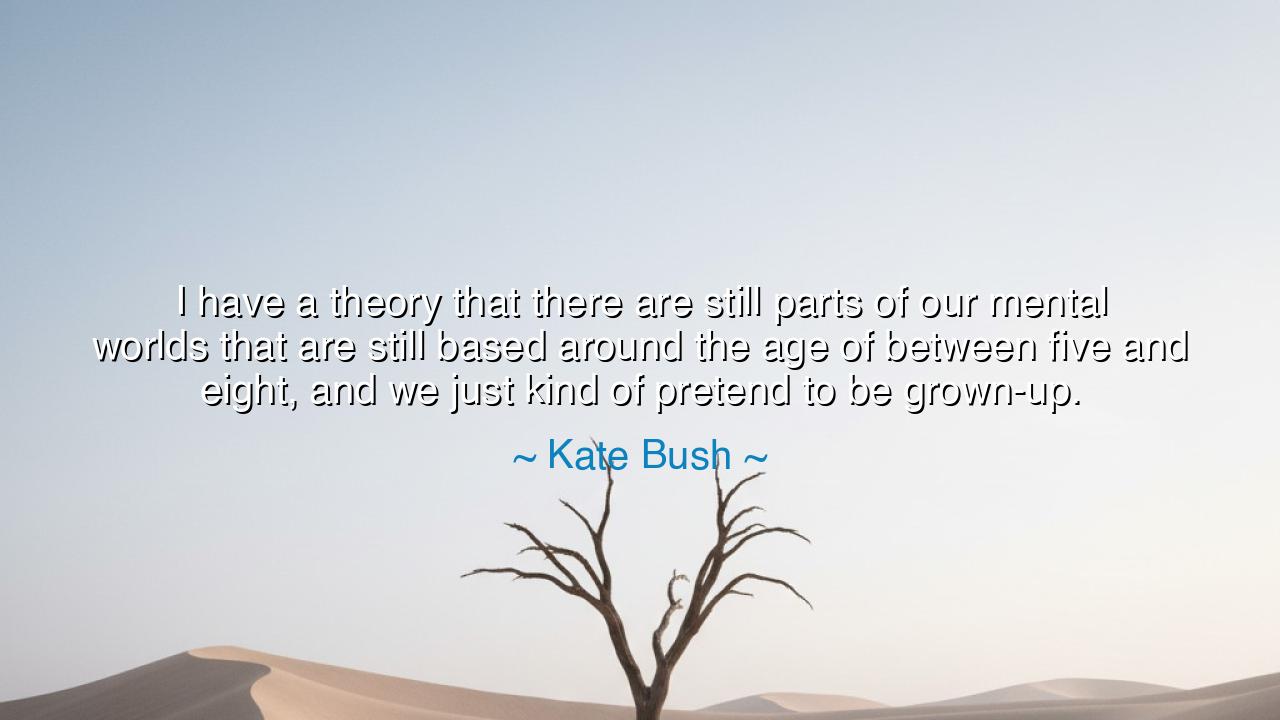
I have a theory that there are still parts of our mental worlds
I have a theory that there are still parts of our mental worlds that are still based around the age of between five and eight, and we just kind of pretend to be grown-up.






"I have a theory that there are still parts of our mental worlds that are still based around the age of between five and eight, and we just kind of pretend to be grown-up." — in this tender and haunting reflection, Kate Bush touches upon a truth that echoes through the ages: that within every adult still dwells the child-self, fragile yet enduring, forgotten yet guiding. Her words are not a mere observation of psychology but a whisper of spiritual insight — a reminder that our earliest years shape the inner kingdom from which we still rule our days. We may adorn ourselves in the garments of maturity, speak with the gravity of reason, and bear the burdens of responsibility, yet deep within, the child of wonder and fear continues to steer the helm.
In the ancient manner of reflection, one might say: the child is the seed, and the man is but the tree that grew around it. For between the ages of five and eight, the soul is wide open to the mysteries of the world. It learns what love feels like, what fear whispers, and what joy truly means. These early impressions do not fade as time passes; they settle deep, forming the foundation of our emotional world, the silent architecture beneath our grown-up façades. Thus, when we are hurt, we cry with the pain of the child who first learned sorrow; when we love, we reach with the same innocent heart that once longed for affection. We only pretend to be grown-up — for the essence of who we are was written long before we learned to hide behind reason.
Consider the story of Helen Keller, who, though struck blind and deaf in her infancy, carried through her life the radiant curiosity of her childhood. When her teacher, Anne Sullivan, placed her hand beneath the flowing water and spelled out the word w-a-t-e-r, something ancient and pure awakened within her — the child-mind that hungered to name the world, to feel it, to belong to it. Helen grew into a philosopher and writer, yet her greatness was born not of intellect alone, but of that eternal child within who never stopped seeking light amidst darkness. Her story teaches that the child’s heart — full of wonder, craving meaning — is not something to be outgrown but preserved, cherished, and kept alive through all the seasons of life.
But the modern soul, too often, buries the child-self beneath layers of pride and performance. We call it professionalism, composure, or strength, yet in truth it is fear — fear of vulnerability, fear of being seen as foolish, fear of appearing unguarded. And so, the adult world becomes a masquerade of self-control, a theater of masks where the innocent imagination is silenced. Yet that same imagination is the fountain from which all art, all love, all courage flow. Kate Bush, a dreamer and visionary in her music, reminds us through her own life’s art that the child within must not be exiled. For she herself built her songs not on the logic of adulthood, but on the wonder of that early age — when clouds were kingdoms, and silence had voices.
Even the ancients understood this truth. Socrates, the philosopher, said that wisdom begins in wonder. What is this wonder but the spirit of the child, unashamed to ask, to marvel, to be moved by the simple and profound? In every age, those who have changed the world — artists, saints, and thinkers alike — have been those who never quite let go of the light of their early years. Leonardo da Vinci saw flight in birds and rivers in the lines of a human hand because his childlike curiosity never dimmed. He pretended to be grown-up, perhaps, but his heart was still that of the boy who watched the wind play with leaves.
Let us then not be ashamed of the child within us. Let us listen when it laughs and weeps, when it hungers for play, when it trembles in fear. For that voice is the truest compass we possess — uncorrupted, uncalculated, unafraid to feel. When we deny it, we become hollow; when we honor it, we become whole. To pretend to be grown-up is inevitable, for the world demands its rituals of duty and composure — but beneath the armor, keep the child alive.
The lesson, therefore, is this: never outgrow your wonder. Nurture your curiosity. Ask questions that seem naive. Dream without shame. Laugh loudly. Allow yourself to love with unguarded sincerity. These are not childish acts — they are sacred ones. The wisest soul is not the one who forgets childhood but the one who learns to walk beside it. For in the end, as Kate Bush so gently reminds us, we do not become adults in truth — we merely grow older around the eternal child who still sees the world in color.
And so, dear listener, guard that child-mind as a flame in the wind. Let it illumine the dark corners of reason, soften the hard edges of ambition, and teach you to see life again as a miracle unfolding. Pretend to be grown-up if you must — but never cease to feel, to wonder, to imagine. For therein lies the secret of timeless youth, and the source of all human greatness.






AAdministratorAdministrator
Welcome, honored guests. Please leave a comment, we will respond soon